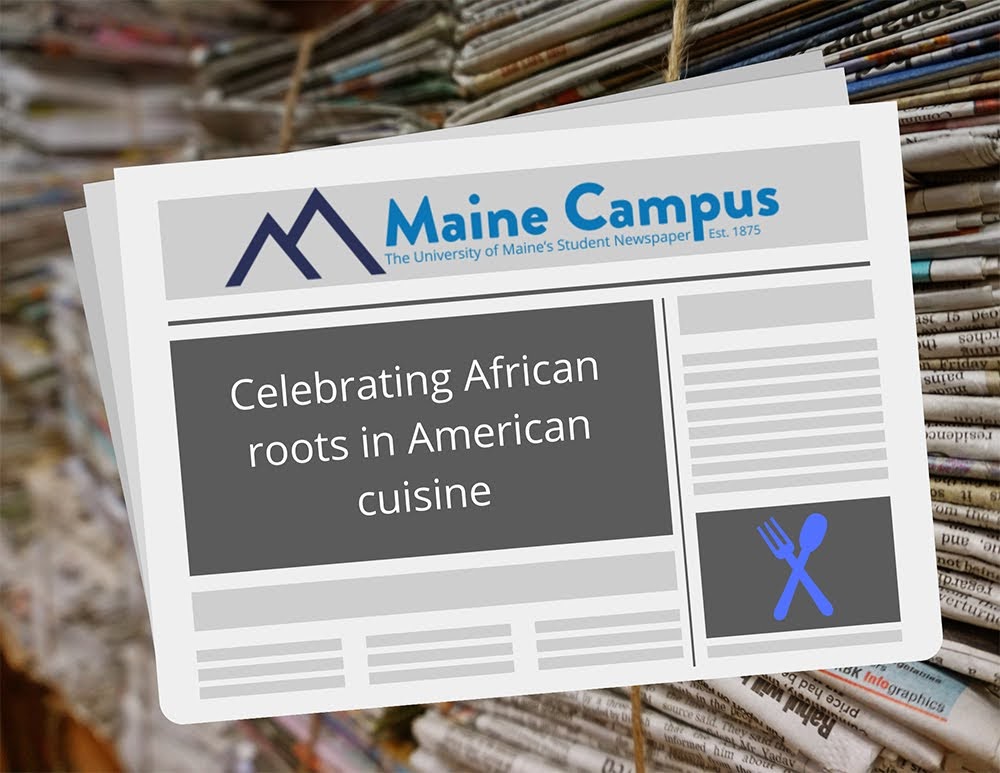February in the United States marks the celebration of Black History Month. The month was initially conceived by Dr. Carter G. Woodson, who founded what is now known as the Association for the Study of African American Life and History in 1915 and in February of 1926 introduced the first week dedicated to the observance of African Americans’ contributions to the history of the United States and world. Black History Month is an opportunity to illuminate the often overlooked contributions to society made by Black Americans. This month at the Maine Campus, we have been honoring Black History Month by lifting up the experiences and accomplishments of Black Mainers. This week’s focus is on the impacts made by the African diaspora on food in the United States.
Take a moment to think of some foods that define American cuisine. You may have thoughts of deep frying, fruit and vegetable pies, barbecue or some staples of “soul food” famous in the South. Additionally, when thinking of fast food and larger corporations, if you have appreciated the tastes of Kentucky Fried Chicken or Coca-Cola, odds are you have enjoyed culinary influences brought to the United States by enslaved Africans. Watermelon, black-eyed peas, okra, hibiscus, palm oil, boiled peanuts, various peppers and coffee all make common appearances in the American diet, and were introduced to North America through the Atlantic slave trade.
The foods themselves are not the only contributions to be credited to Black Americans. For hundreds of years, enslaved Black people worked the fields, harvested the crops, created the recipes, cooked the food, set the table, served the food and washed the dishes. Even today, Black Americans in the foodservice industry are far too frequently left out of employment in fine dining restaurants. Additionally, commercially-sold food brands like Uncle Ben’s and Aunt Jemima, renamed Pearl Milling Company in 2021, have long profited from using the faces of African American characters to sell their products.
While many foods have reached the North American continent from Africa via the Atlantic slave trade, African tastes have made a popular resurgence in the form of classic and fusion-style restaurants. Asmara Restaurant in Portland, for example, offers Eritrean stews and bread, and Saban’s Cuisine in Lewiston serves up halal Somali traditions “with love.” However, this is not an exhaustive list, as there are many more restaurants in Maine that celebrate African heritage.
Further up the coast, Jordan Benissan, a music professor at Colby College, has opened up his own line of restaurants to facilitate cultural exchange and awareness of Togolese traditions among Maine residents. Mé Lon Togo, with locations in Rockland, Searsport and Camden, has gained widespread recognition and support in spite of hardships brought on by the COVID-19 pandemic. Benissan opened his first restaurant in 2017 after spending years preparing homestyle dishes from Togo for his friends, but the restaurant took a hit in 2020 due to the lockdowns and restrictions on foodservice operations. However, members of the community raised nearly $16,000 in just over a week to save his restaurant from closing.
“I didn’t think that I had a community and people who cared about what was going to happen,” Benissan said about the experience. “It is almost a miracle that this happened.” Now that most activities have begun recovering from the pandemic all three restaurant locations are open for customers’ enjoyment and support.
The example shown by the members of Benissan’s community is a shining one in a world with too much uncertainty. However, one does not necessarily need to donate to crowdfunding campaigns to show up for Black members of the community; incorporating the support of Black businesses into your day-to-day activities, whether by making simple replacements or by adding to your routine, is a wonderful way to celebrate and support the efforts made by Black Americans both during this Black History Month and all year round.









